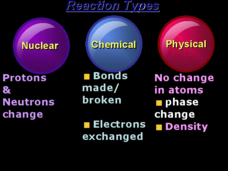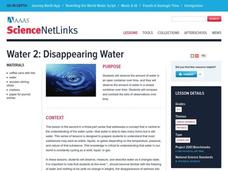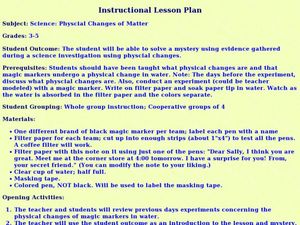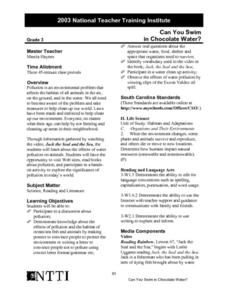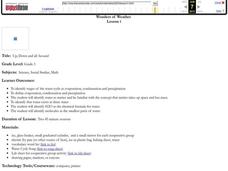Curated OER
The Heat is On!
Fifth graders investigate evidence for changes in matter that occur during a chemical reaction.
Curated OER
Physical Changes and the Water Cycle- Three
Third graders take note of the changes in the water level in a cup of water that is left out. Using a model of the water that depicts a lake and landscape that is being heated by a heat lamp, the students observe precipitation, and...
Nevada Outdoor School
Let It Snow! Let It Melt!
Winter weather offers a great opportunity to teach young scientists about the states of matter. This activity-based lesson includes a range of learning experiences, from experimenting with the rate at which ice melts to singing a song...
Mr. E. Science
Chemical Reactions
Once I told a chemistry joke, but there was no reaction. Get young chemists involved in changes and reactions with a presentation that begins with physical and chemical changes and chemical reactions. It moves on to chemical equations...
Curated OER
Earth's Water
If the majority of our planet is covered with water, why do we need to bother conserving it? With a thorough and varied investigation into the location and types of water on the earth, learners will gain an understanding of why this...
Herff Jones Education
Chemical Energy
Provide the class with a quick lesson on chemical energy as they are assisted in creating hot and cold packs to demonstrate energy transfer between objects. They observe the energy change in matter as it transforms and distinguish...
Center for Learning in Action
Challenge with Solids, Liquids, and Gases
There's a container for every matter—liquid, solid, and gas. Pupils design three different containers, each with the capability to hold one of the states of matter, and share their design with the class.
It's About Time
Properties of Matter
Never trust an atom; they make up everything! Young chemists make modeling dough and add another ingredient to change the properties. Scholars then compare the properties of emulsion to composite materials. A reading passage and analysis...
American Chemical Society
Using the Combining Test to Identify Unknown Liquids
Once investigators have learned how their mystery liquids interact with water during the preceding activity, they now use their observations to identify them. This is an ideal conclusion to the mini unit on the properties of water.
Curated OER
Chemistry Slide Collection
A huge slide show provides a review of almost every topic there is to cover in basic chemistry! Your young scientists will be interested to see each illustration and example given. The appearance of the 120 slides varies greatly, most...
Curated OER
State Change
Eighth graders explore the physical change of matter. As a class, they discuss their favorite super hero and determine if the hero undergoes a physical or chemical change. Students examine the change of state and phase change. In groups,...
Curated OER
Mixtures of Matter
Students experiment with solids and liquids. In this mixtures of matter lesson, students combine matter to form solutions. Students hypothesize, test, and analyze the data to draw conclusions. The lesson can be extended by having...
Curated OER
Disappearing Water
Learners explore the water cycle. In this earth science lesson, students observe and measure water in a closed container and in an open container. Learners record their observations and compare their sets of data to draw conclusions...
Curated OER
Water and Ice
Students experiment with water and ice. In this states of matter instructional activity, students explore how water can change from a solid to a liquid and back again. They discuss and write about the results of the experiment in a...
Curated OER
Physical Changes of Matter
Students solve a mystery using evidence gathered during a science investigation. In this physical changes lesson, students analyze a note written in marker to determine the physical changes the ink from the pen underwent. Students...
Curated OER
Water and Ice
Students examine water. In this chemistry instructional activity, student examine the physical properties of water and how it changes from a liquid to a solid or a gas. This instructional activity contains links to a second and third...
Curated OER
Can You Swim in Chocolate Water?
Third graders discss water pollution and its affects on animals. They watch a demonstration using a plastic fish in a fish bowl in which various types of water pollution are illustrated.
Curated OER
Wonders of Weather
Fourth graders complete activities to study weather and the water cycle. In this water cycle lesson, 4th graders observe a demonstration of the three stages of water. Students work in groups to complete a water cycle lab activity....
Curated OER
What's the Matter?
Students explore the components of matter. They discover what matter is, the states of matter, and how heat and cold cause it to change states in an online format. In addition, they complete internet-based lessons, activities, and quizzes.
Curated OER
What is Matter?
Students understand what matter is and that it can be changed. In this matter lesson, students participate in an experiment to get rid of matter. Students record their results.
Curated OER
A Matter of State
Students conduct science experiments to understand that particle movement changes as a substance changes from one phase to another phase. Students record observations of experiments that involve the three states of matter: solid,...
Curated OER
Change It
Fourth graders expand their knowledge about how the physical properties of a substances can be changed. They are given multiple opportunities, using first-hand experiences and familiar objects in different contexts, to identify...
Curated OER
Ready, Set, Let's Dough! It's a Matter of System
Students explore physical sciences by participating in a class experiment. In this matter instructional activity, students identify the three forms of matter and their physical differences. Students utilize cookie dough to create a play...
Novelinks
The Color of Water: Concept Analysis
Considering using James McBride's autobiography/memoir The Color of Water with your class? Check out this seven-page informational packet that includes background information on McBride, the organization pattern of the book, and issues...











